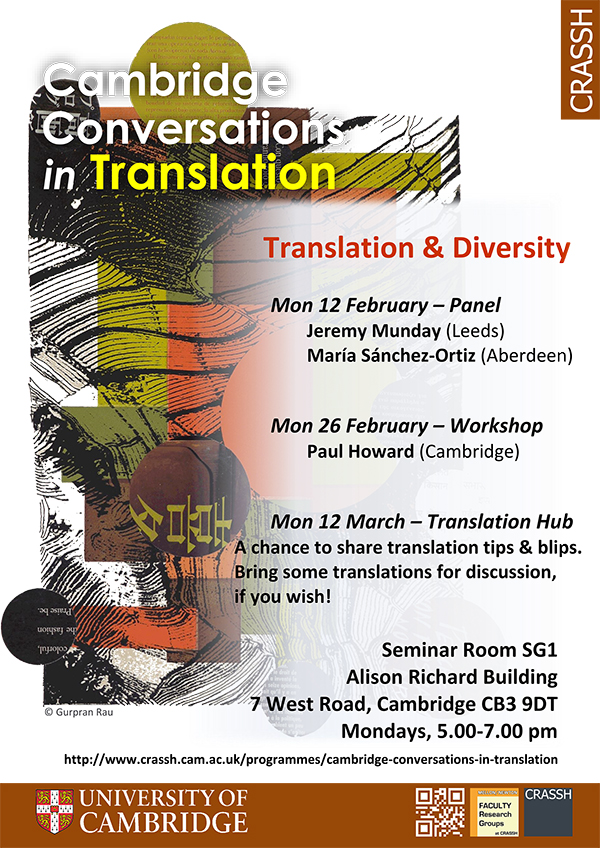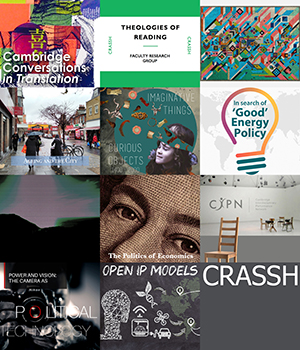Cambridge Conversations in Translation is one of eleven interdisciplinary CRASSH Research Groups running fortnightly seminars in the academic year 2017-18. Imke van Heerden caught up with the group’s convenors, Ángeles Carreres, Monica Boria, María Noriega-Sánchez and Marcus Tomalin.

Q. How did Cambridge Conversations in Translation come about?
Our group originated thanks to the initiative of one of our former convenors, Nicole Robertson. In 2013 Nicole founded Cambridge Literary Translators (CLT), an eclectic group made up of academics, students and translators who got together periodically to share and discuss their own translation work in an informal environment. Nicole and other members of CLT realised that there was no current forum in the University to bring together people with an interest in translation, and that is how the idea of forming a CRASSH research group came about.
Cambridge Conversations in Translation (CCiT) began in October 2015 with a clear purpose: our aim was to provide a forum for anyone and everyone with an academic and/or practical interest in translation to come together and exchange ideas. We are particularly interested in getting academics and professional translators talking to one another. There is a lot of fascinating research on translation being carried out in the different Faculties, but there is as yet no institutional structure within the University to bring those colleagues and students together. Our group has come to fill this gap, and for those involved with translation in Cambridge, CCiT has rapidly become a point of reference. Indeed, the feedback we have received both from speakers and participants strongly confirms our own perception that CCiT provides something that is not offered elsewhere in the University.
Q. By definition, a CRASSH research group has an interdisciplinary question at its core. What’s yours?
Translation, by its very nature, is an activity that invites interdisciplinary approaches, so the interaction with other disciplines comes naturally. Our speakers and workshop participants come from fields as diverse as literary studies, linguistics, philosophy, history, theology, anthropology, drama studies, journalism, film studies, music… All these fields have something to say about translation, and we are delighted that our series has afforded them, and us, the opportunity to interact with one another.
The combination of more speculative approaches and the actual practice of translation is a core feature of the CCiT series, so for each of the topics we hold one panel discussion with two or three experts (academic or other professionals) and a thematically-related workshop that gives participants the opportunity to engage with translation at a more practical level. This year we have also introduced a new component: the ‘Translation Hub’, which offers all attendees the possibility to share and discuss their own working translations and to get focused feedback and advice from other fellow translators in a relaxed, non-hierarchical setting. In a way, the hub sessions seek to re-connect with the spirit of Cambridge Literary Translators, the precursor to CCiT.
To give you a concrete example of CCiT’s interdisciplinary approach: in June 2017, we held a one-day event on the topic of ‘Translation and Multimodality’, where we examined the role(s) of translation primarily in non-verbal areas of expression, including various modes of performance, such as dance, music, and the visual arts. The event was extremely well received – there was real buzz in the room as we moved from watching a film on Japanese experimental dance especially produced by one of our speakers, to interacting with a word art exhibition, to making music, all that activity interspersed with presentations by a range of experts from various fields. You can read more about it here. This event inspired us to keep exploring the subject of translation and multimodality in a conference we will be holding on 5–6 July this year.
Q. Why is it valuable to study translation?
Translation has always been central to human communication and cultural and scientific exchange. In today’s connected, multilingual world, translation has an essential role to play in ensuring that individuals and communities can tap into the benefits of globalisation, while at the same time preserving their cultural specificity. But beyond its instrumental value in enabling communication across languages and cultures, the process of translation throws up some key ethical and epistemological questions. Translation offers a vantage point from which to interrogate the nature of knowledge and human understanding. It highlights the contingent nature of notions and beliefs that – from a monolingual perspective – may appear rock solid. It brings into focus something that is today more relevant than ever, namely, that the transfer/construction of meaning of necessity entails genuine engagement with the other – the will to reach out and build bridges. As soon as one scratches the surface, the common belief that translation is a straightforward process of replacing words with equivalent words in another language proves to be an illusion. The conveyance of meaning is rarely a smooth process: it is more often than not the result of complex negotiation and compromise.
Q. Could you tell us a bit more about your convenors, speakers and attendees and the perspectives they bring to the discussion?
The four convenors have a background in literary studies and linguistics. Our individual interests take us in different directions, but what brings us together is a shared passion for translation, each from our particular angle. Jointly, our interests range from translation theory to machine translation, from the translation of poetry to multimodal translation, from the role of translation in language learning to computer generated poetry. Each one of us has learnt heaps from the others, and I think we’d all agree that working together has been really stimulating and enjoyable.
As we said above, our speakers and audiences have included people from a vast range of disciplines, including music, film, theology, anthropology, history, linguistics, including computational linguistics, literary studies, education, journalism. Having the opportunity to interact with such a wide range of academics, professionals and students has been tremendously enriching, both on an intellectual and on a personal level – definitely one of the highlights of running the group.
Q. What can we expect from Cambridge Conversations in Translation in 2018?
In our regular sessions this year, we are going to focus on two main topics: ‘Translation and Diversity’ and ‘Translation and Gender’. In addition to our regular meetings, we are excited to be hosting an international conference on the subject of translation and multimodality on 5–6 July, building on the one-day event on the subject we held last summer (see question 2 above). The conference – Beyond Words: Multimodal Encounters in Translation –, as its title indicates, aims to move beyond translation as interlingual transfer and explore instances of text-to-music, text-to-dance, text-to-image, dance-to-image, music-to-dance, dance-to-text, and image-to-music transfers. We are excited to count on the participation of a number of international experts from various fields, and very much look forward to the fruitful interactions that are bound to take place. We are currently finalising the programme, which we will be publicising shortly, so watch this space!
Our group has accounts on both Facebook and Twitter and we run a mailing list to send out information about our events (no spam!), which you can join here. Everyone is welcome to all of our events, so do come along!

View a larger version of the Lent programme here.
About CRASSH Research Groups
The CRASSH Research Groups Programme supports groups of Cambridge graduate students and faculty members with a common interdisciplinary research interest, bringing together early-career researchers, established academics and guest speakers on particular research topics for a year of collaborative work. The groups run bi-weekly events which are free and open to all.
Do you have an exciting, new idea that needs detailed exploration? Apply to us for funding.


